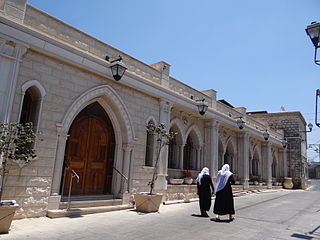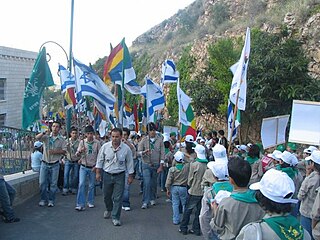
The demographics of Israel, monitored by the Israel Central Bureau of Statistics, encompass various attributes that define the nation's populace. Since its establishment in 1948, Israel has witnessed significant changes in its demographics. Formed as a homeland for the Jewish people, Israel has attracted Jewish immigrants from Europe, Asia, Africa, and the Americas.

The Arab citizens of Israel form Israel’s largest ethnic minority. They are mostly former Palestinian citizens who have continued to live in what became Israel, and their descendants. The majority of Arabs in Israel now prefer to be identified as Palestinian citizens of Israel.

Daliyat al-Karmel is a Druze town located on Mount Carmel in the Haifa District of Israel, around 20 km southeast of Haifa. In 2022 its population was 18,001.

The Sword Battalion, previously Unit 300 and also known as the IDF Minorities Unit, was an Arab-dominated military unit of the Israel Defense Forces. It predominantly enlisted Druze, who made up the majority in the unit until it was disbanded in 2015, although a sizable number of recruits were Bedouin and non-Arab Circassians. Men from the Druze and Circassian communities are subject to Israeli conscription laws, while Bedouin and other Arabs may voluntarily enlist for military service.

Majdal Shams is a predominantly Druze town in the Israeli-occupied Golan Heights, located in the southern foothills of Mount Hermon. It is known as the informal "capital" of the region.

Education in Israel encompasses consists of three primary tiers: primary education, middle school, and high school. Compulsory education spans from kindergarten through 12th grade. The academic year begins on September 1 and ends on June 30 for elementary pupils and June 20 for middle and high school pupils. The Haredi Yeshivas adhere to a separate schedule, commencing on 1 Elul.

Kafr Yasif is an Arab town in the Northern District of Israel. It is located 11 kilometers (6.8 mi) northeast of the city of Acre and adjacent to Abu Sinan and Yarka. The population of Kafr Yasif is half Christian (52.1%) with the rest Muslim (44.9%), and a small Druze community.

Arab localities in Israel include all population centers with a 50% or higher Arab population in Israel. East Jerusalem and Golan Heights are not internationally recognized parts of Israel proper but have been included in this list.

Christianity is the third largest religion in Israel, after Judaism and Islam. At the end of 2022, Christians made up 1.9% of the Israeli population, numbering approximately 185,000. 75.8% of the Christians in Israel are Arab Christians. Christians make up 6.9% of the Arab-Israelis.

The WZB Berlin Social Science Center, also known by its German initials WZB, is an internationally renowned research institute for the social sciences, the largest such institution in Europe not affiliated with a university.

Israeli Druze or Druze Israelis are an ethnoreligious minority among the Arab citizens of Israel. They maintain Arabic language and culture as integral parts of their identity, and Arabic is their primary language. In 2019, there were 143,000 Druze people living within Israel and the Israeli-occupied Golan Heights, comprising 1.6% of the total population of Israel. the majority of Israeli Druze are concentrated in northern Israel, especially in Galilee, Carmel and the Golan areas.

The Israel Studies Review is a peer-reviewed academic journal published on behalf of the Association for Israel Studies by Berghahn Books and covering the study of all aspects of society, history, politics, and culture of Israel. The journal was previously known as the Israel Studies Bulletin from 1992 to 2001 and as the Israel Studies Forum from 2001 to 2010. The editors of the journal since summer 2021 are Oded Haklai and Adia Mendelson-Maoz. Rami Zeedan is the journal's book review editor.
Basic Law: Israel as the Nation-State of the Jewish People, informally known as the Nation-State Bill or the Nationality Bill, is an Israeli Basic Law that specifies the country's significance to the Jewish people. It was passed by the Knesset—with 62 in favour, 55 against, and two abstentions—on 19 July 2018 and is largely symbolic and declarative in nature. The law outlines a number of roles and responsibilities by which Israel is bound in order to fulfill the purpose of serving as the Jews' nation-state. However, it was met with sharp backlash internationally and has been characterized as racist and undemocratic by some critics. After it was passed, several groups in the Jewish diaspora expressed concern that it was actively violating Israel's self-defined legal status as a "Jewish and democratic state" in exchange for adopting an exclusively Jewish identity. The European Union stated that the Nation-State Bill had complicated the Israeli–Palestinian peace process, while the Arab League, the Palestine Liberation Organization, the Organization of Islamic Cooperation, and the Muslim World League condemned it as a manifestation of apartheid.
Israelization or Israelisation, also called Israelification, is a sociological term for the process in which minority groups in Israel adopt the lifestyle, language, culture, political and other characteristics of the dominant population in Israel.
Feminism in Israel is a complex issue in contemporary Israeli society due to the varied demographic makeup of the country and the country's particular balance of religion and state issues. For secular Israeli women, the successive campaigns for women's rights and equality reflect a similar timeline and progression as Western democracies. For Israeli Arabs, however, the issue of feminism is strongly linked to Palestinian causes. And for Orthodox Jews, selected women's rights and women's representation in the Israeli Parliament are recently debated issues.

Zionism has been described by several scholars as a form of settler colonialism in relation to the region of Palestine and the Israeli–Palestinian conflict. This paradigm has been applied to Zionism by various scholars and figures, including Patrick Wolfe, Edward Said, Ilan Pappe and Noam Chomsky. Zionism founders and early leaders were aware and unapologetic about their status as colonizers, Many early leading Zionists such as Ze'ev Jabotinsky in "The Iron Wall", described Zionism as colonization.

In Israel, the mixed cities or mixed towns are the eight cities with a significant number of both Israeli Jews and Israeli Arabs. The eight mixed Jewish-Arab cities, defined by the Israel Central Bureau of Statistics as those with more than 10% of the population registered as "Arabs" and more than 10% of the population registered as "Jews", include the following seven Israeli cities: Haifa, Lod, Ramle, Jaffa, Acre, Nof HaGalil, and Ma'alot Tarshiha. Approximately 10% of the Arab citizens of Israel live in these seven cities. The eighth city is Jerusalem, in which the Arab part of the city, East Jerusalem, has been annexed by Israel but is not recognized as such under international law.












